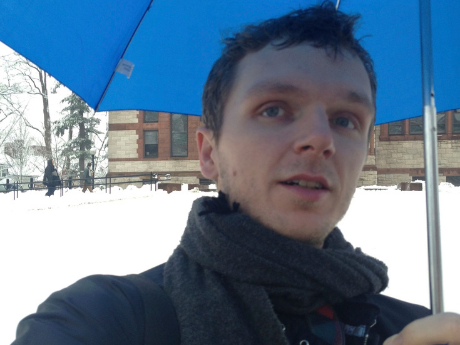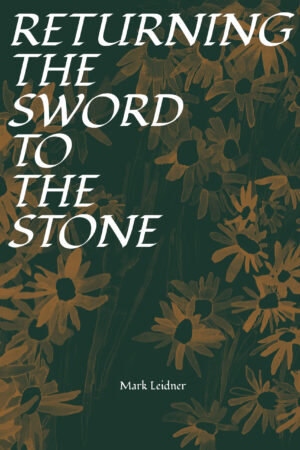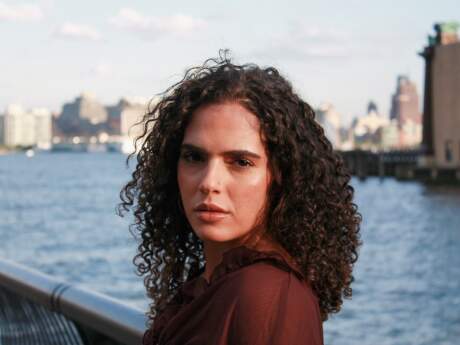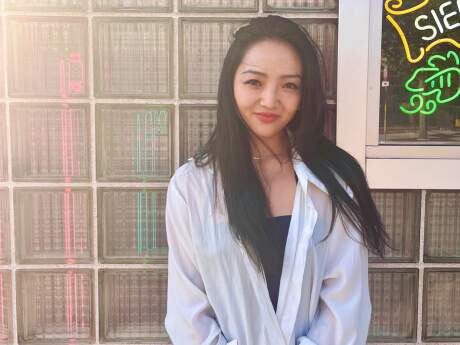In Their Own Words
Mark Leidner on “Having ‘Having a Coke with You’ with You”

Having “Having a Coke with You” with You
You asked me if I knew the poem “Having a Coke with You”
I said I vaguely remembered it but didn’t really
so you recited it in its entirety. We were walking
from somewhere up by City Hall down toward South Street
and the whole time you were reciting it I was wondering
“Was that the last line of the poem?” after each line
and each time I thought that, I thought it even more
because as the poem got longer the fact that you were reciting it
from memory became incrementally harder to believe
until about two-thirds of the way through the poem
I stopped thinking about how long it was and just started listening
which I had been, but only a little, because of all that. Anyway
then I started listening to it completely, believing
the poem itself to be the sole reason you were reciting it
but as soon as you finished you started to talk about how
you used to think that that poem was just about how
liberatingly banal being in love with someone was
but then you said you’d started to think more recently
it was more about the idiocy of caring about art at all
when you could spend all that energy caring about someone
you loved instead, and you said you were wondering where
I stood on that question now that I had heard the poem
and I was as struck by the question as I was stunned
that you could so casually recite such a long good poem
and that you hadn't even recited it primarily to solicit
appreciation for your recitation so much as to ask
what I thought about what you had thought about it
then, versus how you thought about it now, and this was
when I knew I wanted to be with you forever.
Reprinted from Returning the Sword to the Stone (Fonograf Editions, 2021). Reprinted with the permission of the publisher.
On "Having 'Having a Coke with You' with You"
I was walking through Philly with my future spouse, and the events of the poem unfolded more or less as described. We got engaged later that day while watching the Kentucky Derby. We bet that if both of our horses came in 1st and 2nd, we would get married the next day. To our shock, they did. In the harrowing moments just after the race, we had to decide if the bet had been real or a joke. To ease into the uncertainty, we googled what it would actually take to get married so quickly. We learned it would be a logistical pain in the ass, so we decided to honor the bet by delaying it until we could do it with no hassle, one month later. At the time, we were living in different cities and both planning to move to separate coasts. I changed my plans. We moved west. We married on the move and met each other’s families after. When I met my mother-in-law for the first time, she was already my mother-in-law. She asked me point blank why I’d married her daughter. I didn’t know how to articulate why without sounding like a babbling idiot. Then I remembered that moment, walking in Philly, so I told her the story the poem relates. It seemed to help her understand, and that it did cemented the anecdote’s importance even more in my memory.
I don’t often write about my so-called real life, but this story seemed to illustrate something of the power of poetry, so I think I wrote it as a tribute to poetry as much as to love. In general, I don’t think life or love or poetry is made up of singular, pivotal turning points. They are processes stretched over time and comprising feelings and decisions and materials too complex to be packaged in anecdotes. But in this case, this moment leapt out to me because it actually did happen this way; a single anecdote actually did become a kind of epic hinge in my life. When I reflect on this moment, I feel inspired by love, by its ability to inspire the good kind of risk-taking, and the happy surrender to a mind outside your own simply because you respect and admire it. To remember it to myself and be able to preserve it against the haze that all memories fade into was another objective of the writing. Finally, in the past I’d had a love–hate relationship with Frank O’Hara’s poetry. I didn’t particularly like it for a particularly stupid reason: I didn't want to like anything so many other people seemed to love. This was ordinary ego and envy joining to curb my enthusiasm for the very poet who might have had the most to teach me, in the same way many people like to hold a suspicion of things other people enjoy. So that she recited this famous poem and helped me see its complex beauty in a way that in turn helped me confront the narrowness with which I was reading its famous poet, also felt redemptive. I like the notion that poetry itself, or perhaps a kind of universal soul that poetry in all its forms represents, has a will that resists our narrow human understanding—except in fleeting moments when it reveals its patterns to challenge the pathetic barriers we (who as poets ought to be the most open to its forces) put up against it out of arrogance. Now of course when I read Frank O’Hara, I marvel at the cutting truths and exuberant wisdom and formal innovation and spiritual kinship that was always there but which I had always been shut to—until I actually listened to someone else whose voice I loved say the same words he’d been saying for all these years.



